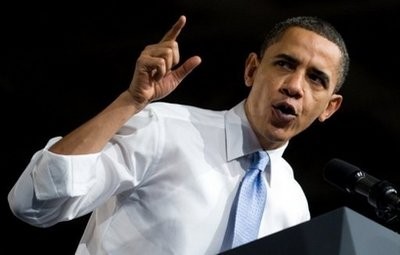
WASHINGTON (AFP) – President Barack Obama denied a crisis was rocking US-Israeli relations as his top diplomatic aide arrived Thursday in Moscow for a meeting of the Middle East quartet.
Obama's first public comments on the showdown came Wednesday as his administration awaited a response from Israeli Prime Minister Benjamin Netanyahu about Washington's sharp complaints over the announcement of new settlements.
Secretary of State Hillary Clinton arrived in Moscow early Thursday for a meeting of the international quartet on Middle East peace talks -- involving partners Russia, the United Nations and the European Union -- without holding her expected telephone call with Netanyahu.
"We're still looking forward to a response. It hasn't happened yet," Mark Toner, a State Department spokesman, told reporters in Washington after Clinton's departure.
Obama was conciliatory when asked in an interview with Fox News if there was a "crisis" in US-Israeli relations after the announcement on 1,600 new settler homes in annexed east Jerusalem, which embarrassed Vice President Joe Biden during a visit last week to the Jewish state.
Israel formulating reponse
"No," Obama answered. "We and the Israeli people have a special bond that's not going to go away.
"But friends are going to disagree sometimes... there is a disagreement in terms of how we can move this peace process forward."
Obama noted that the announcement on new settler homes was the work of the Interior Ministry in Israel and that Netanyahu had apologized.
He called on both Israelis and Palestinians to "take steps to make sure that we can rebuild trust."
Israel's ambassador to the United States, Michael Oren, insisted meanwhile in an article for The New York Times that relations between Washington and Jewish state "can sustain occasional disagreements, and remain unassailably solid."
The allies "must never allow such differences to obscure the purpose we share or to raise doubts about the unbreakable bonds between us," he wrote.
The White House was also considering proposing a US plan to form the basis of Israeli-Palestinian negotiations, the Times reported, as US officials questioned the commitment of Netanyahu's government to peace talks.
Should Obama present his own proposal, complete with territorial maps, it would likely not take place until his special envoy to the Middle East, George Mitchell, had engaged in several months of US-brokered indirect "proximity" talks between the two sides, the Times said.
Netanyahu spoke overnight with Vice President Biden, the prime minister's office in Jerusalem said. A White House aide would only say that the call was part of "ongoing negotiations."
US-Israel ties 'unassailably solid': ambassador
In previous contact last week, Clinton told Netanyahu that Israel's treatment of Biden had sent a "deeply negative signal" just as Washington persuaded Palestinians to join indirect "proximity" peace talks.
She said earlier this week that Washington was engaged in "very active consultation" with the Israelis over steps that would demonstrate the requisite commitment getting peace talks on again.
The Israeli government has shown no sign of backing down on the wider issue of Jewish settlements, even if it welcomed US assurances that its bond with the United States was safe following the row.
Foreign Minister Avigdor Lieberman said demands for a halt to building homes for Jewish settlers in mostly-Arab east Jerusalem were "unreasonable."
Related article:Mideast Quartete meet will show support for talks:US Israel's announcement involved the new homes for Jewish settlers to be built in mainly Arab east Jerusalem, annexed after being captured in 1967.
Netanyahu is due to visit the United States next week to speak at a meeting of AIPAC, the pro-Israel lobby.
























